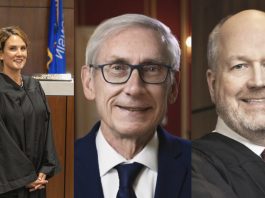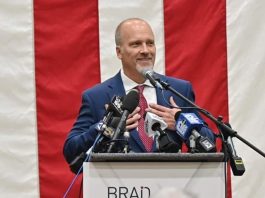We reached out to three prominent women’s groups about the Tearman Spencer harassment accusations, and none would comment. One was extremely vocal during the John Norquist scandal. Why is #metoo MIA?
You would think that prominent women’s and community advocacy groups would have something to say about the accusations that Milwaukee City Attorney Tearman Spencer harassed multiple employees, including allegedly commenting on a female staffer’s legs.
You would be wrong. You’d also think the mainstream media would be writing stories asking them for reaction. Wrong again.
Wisconsin Right Now contacted the Wisconsin Chapter of Nine to Five (one of the more prominent outspoken groups during the John Norquist sexual harassment episode), the Wisconsin Coalition Against Sexual Assault (WCASA), and Community Advocates – Milwaukee, through emails as well as follow-up phone calls. We asked for comment on the Spencer allegations. None responded. It appears that Milwaukee City Attorney Spencer’s alleged bad behaviors do not merit comment. Instead, WCASA has been spending its time tweeting negative comments about the police.
That group also retweeted an article with a caption, “Disparities of power are embedded in our culture — but the good news is we can disrupt and challenge oppressive behaviors like workplace sexual harassment.” The article focuses on accusations against New York Gov. Andrew Cuomo.
Yet, in their own backyard, these groups are silent. It wasn’t always this way.
Over two decades ago, Milwaukee saw its mayor accused of sexual harassment and infidelity over a five-year affair with a subordinate. John Norquist served the city for 16 years before his career was derailed by his behavior. His employee – Marilyn Figueroa – subsequently filed state and federal complaints of sexual harassment and racial discrimination – saying Norquist used his position of power to coerce her into the long-standing relationship.
Leading women’s groups around the city – most notably the 9 to 5 Organization – rallied behind Figueroa. The outcry fueled by such organizations, the media, and others was huge and led to several public apologies by Norquist. He admitted his role in the affair but stated it was consensual. Norquist eventually decided not to seek a fifth term as mayor, and left Milwaukee in 2004.
Tearman Spencer Harassment Allegations
Fast forward to 2021. Another prominent, high-powered individual – Milwaukee City Attorney Tearman Spencer – has recently been accused by six workers in his office of harassment and discrimination. Allegedly, since last April when Spencer was elected to the position, he has frequently made inappropriate remarks to several women, as well as initiating unwanted physical contact with one. Spencer has admitted no wrongdoing, going so far as to appear on a local radio show dismayed that he could not fire the people who are accusing him of harassment, saying they are “crying wolf.”
While the Norquist and Spencer allegations are not the same, there is a common thread between the two. Prominent elected officials using their powers to basically do as they want in the workplace.
This is where the similarity ends. In the case of Mayor Norquist, the widespread uproar it caused led to his eventual downfall. However, in regards to Attorney Spencer, there has been very little public response of the sort.
Several of the same women’s groups were contacted for this article and asked to comment about the Tearman Spencer harassment case, including the fact that Milwaukee elected officials are not subject to anti-harassment policies like other employees.
When Mayor John Norquist was made to pay for his indiscretions and basically run out of town by public sentiment and organized protests, the #METOO movement did not even exist.
Today, the #METOO movement is prominent but appears to be M.I.A. (as are the local women’s organizations that rally to support victims of hostile work environments) when it comes to City Attorney Tearman Spencer.
No public outcry. No organized protests. No demands for helping those allegedly on the receiving end of Spencer’s remarks and physical touching. In Norquist’s case there was anger and outrage, but in Spencer’s case there is marked indifference. The general public can only wonder: Why such different reactions?
Table of Contents







![WATCH: Elon Musk Town Hall Rally in Green Bay [FULL Video]](https://www.wisconsinrightnow.com/wp-content/uploads/2022/04/Elon_Musk_3018710552-265x198.jpg)



![The Great American Company [Up Against the Wall]](https://www.wisconsinrightnow.com/wp-content/uploads/2025/03/MixCollage-29-Mar-2025-09-08-PM-4504-265x198.jpg)
![The Wisconsin DOJ’s ‘Unlawful’ Lawman [WRN Voices] josh kaul](https://www.wisconsinrightnow.com/wp-content/uploads/2025/03/MixCollage-29-Mar-2025-08-48-PM-2468-265x198.jpg)